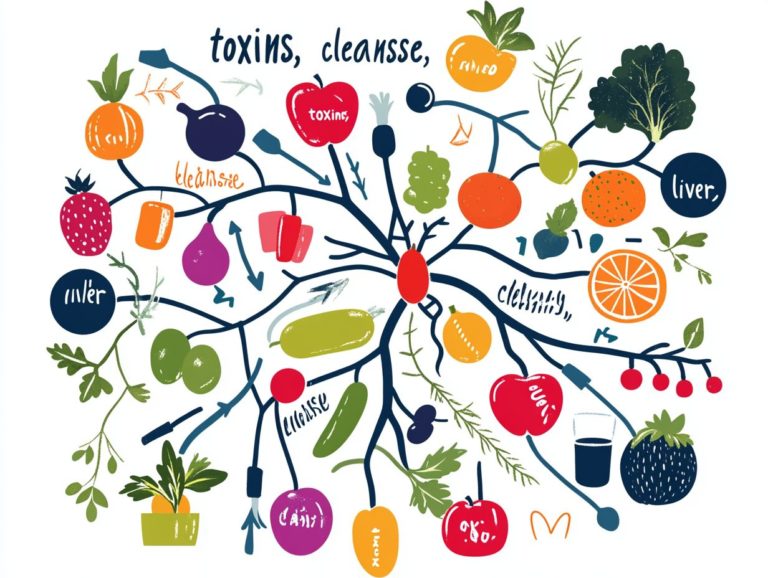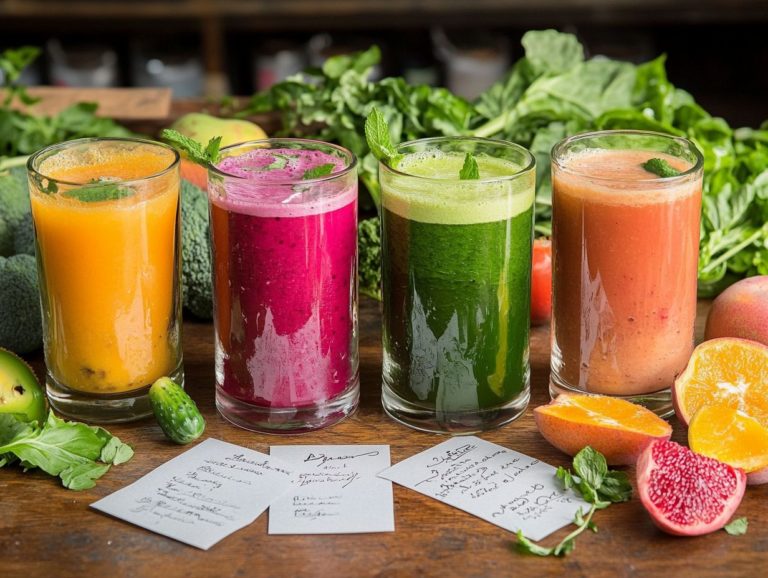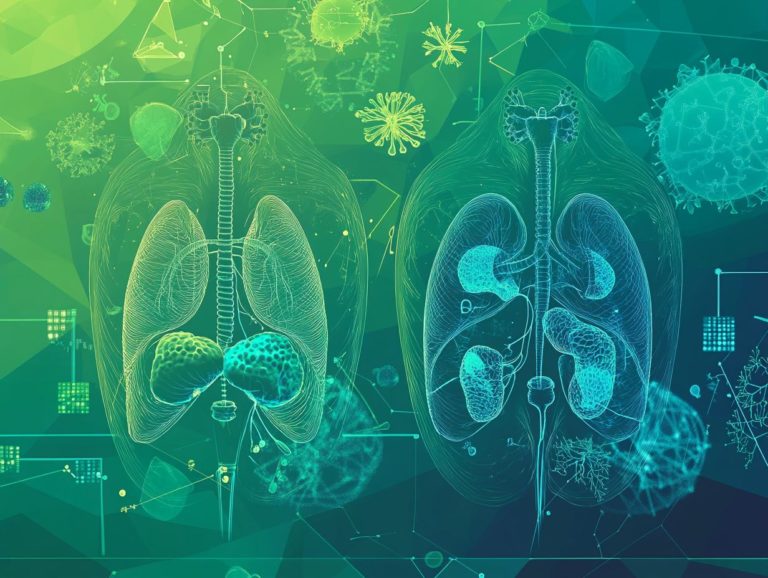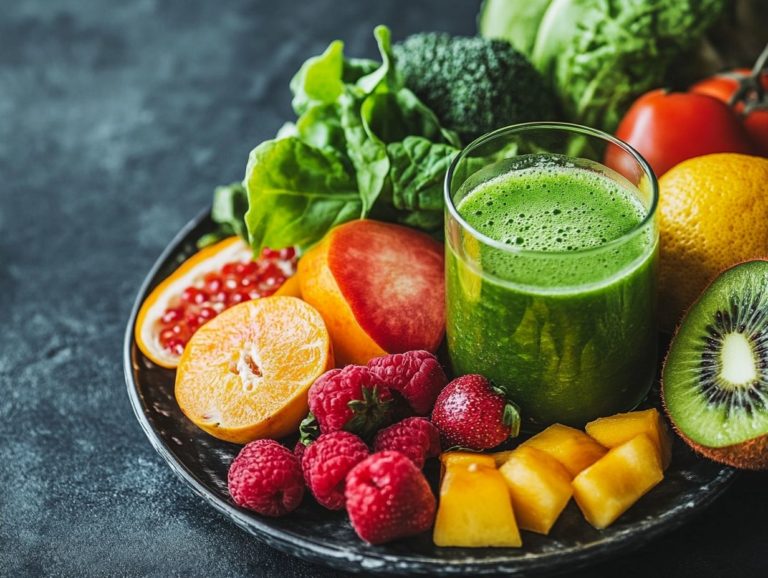Detoxification: How Long Does It Take?
Detoxification is a journey that many individuals pursue to achieve a fresh start, whether it s about cleansing the body of toxins or enhancing overall well-being.
This article delves into the essence of detoxification, highlighting its numerous benefits and the various factors that influence its duration.
You ll explore popular methods such as juice cleanses and water fasting, along with essential tips on nutrition and exercise that will support your detox journey.
Are you ready to dive in and learn more?
Contents
Key Takeaways:

- Detoxification can vary in duration due to individual differences, type of detox program, and level of toxin exposure.
- Common detox methods such as juice cleanses, water fasting, and colon cleansing have different timeframes and should be carefully chosen based on individual needs and goals.
- Supporting your body with proper nutrition, hydration, exercise, and rest can help optimize the detoxification process and its benefits.
Understanding Detoxification
Detoxification is crucial for those battling addiction to drugs or alcohol. It helps remove toxic substances from your body while effectively managing withdrawal symptoms, which can range from mild discomfort to serious medical complications that may necessitate professional detox.
Understanding the detox process is essential for anyone seeking recovery. It involves not just physical elements, but also the strong urges to use substances and physical dependence that often accompany substance use. With the right support from recovery centers and attentive medical care, you can successfully navigate this challenging journey toward healing and sobriety.
What is Detoxification?
Detoxification is your gateway to reclaiming a life free from the grips of drugs or alcohol. It is the essential medical process that expertly manages withdrawal symptoms as you embark on your journey of recovery. This pivotal phase lays the groundwork for regaining control, gently guiding your body into a state that can embrace further therapeutic interventions.
While detoxification effectively alleviates the immediate physical discomfort of substance cessation, it also delves into the psychological facets of addiction, preparing you for the psychological therapies that typically follow. You’ll find a range of treatment options designed to meet your unique needs, such as:
- Inpatient programs offering around-the-clock medical supervision.
- Outpatient programs that provide the flexibility you need to balance work or family commitments.
Both avenues can be customized with personalized care plans, ensuring you receive the right support tailored to your journey toward recovery.
The Importance of Detoxification
The significance of detoxification is paramount, serving as a critical foundation in the recovery journey for those overcoming substance use disorders. It allows you to cleanse your body of addictive substances while receiving essential medical care and psychological support from skilled professionals.
This process heals your body and sets the stage for lasting recovery and well-being.
Benefits of Detoxification
Detoxification offers many benefits, such as the elimination of toxic substances, alleviation of physical dependence, and effective management of withdrawal symptoms. Together, these elements pave the way for enhanced mental health and a significant reduction in psychological cravings tied to addiction.
This essential process encourages the restoration of your body’s natural balance, allowing you to experience increased energy levels and improved physical well-being. By flushing out harmful substances, you ll find better nutrient absorption, ultimately supporting your overall health. Detoxification also grants you a clearer mind, enhancing your focus and emotional stability crucial elements during recovery.
This holistic approach tackles immediate physical challenges and establishes a strong foundation for ongoing treatment, fostering resilience and giving you the power to embrace a healthier lifestyle as you move forward.
Take the first step toward a healthier life today!
Factors that Affect the Duration of Detoxification

The duration of detoxification can vary significantly based on several factors unique to each individual. Your age, health status, and substance use history all play a crucial role. The specific detox program you choose and the level of toxin exposure you’ve experienced are also important.
Get to know these factors to make your detox journey smoother and more successful!
Individual Differences
Individual differences greatly influence how long detox takes. Factors like genetics, previous substance use patterns, and other mental health issues can affect how quickly you can safely detox from addictive substances.
If you have a family history of substance abuse, your withdrawal process may take longer. This can be due to inherited traits that affect your metabolism how your body processes substances or brain chemistry.
Your overall health history also impacts the detox process. Understanding your unique situation is essential for tailoring approaches.
Mental health issues such as anxiety or depression can intensify withdrawal symptoms, potentially extending your detox period. Knowing these individual attributes is crucial for creating effective recovery plans that meet your specific needs.
Type of Detox Program
The type of detox program you choose can significantly influence the overall duration of your detox journey. Options range widely from medically supervised inpatient programs at recovery centers to outpatient strategies for those with milder dependencies.
Choosing inpatient detox programs gives you around-the-clock medical supervision. This setup allows for immediate intervention if severe withdrawal symptoms arise, often leading to a shorter and more effective detox experience.
Outpatient programs offer greater flexibility but may extend the detox process since you re still exposed to potential triggers in daily life.
There are also holistic approaches that incorporate nutritional and wellness support, which can play a crucial role in the pace of your recovery. Engaging in professional detox services is vital for safely managing withdrawal. Healthcare professionals can provide the necessary medications and therapies to ease the process and enhance your experience.
Level of Toxin Exposure
The level of toxin exposure you ve experienced can significantly impact how long your detox will take. If you have a higher dependence on substances like alcohol, opioids, or benzodiazepines, you re likely to face more intense withdrawal symptoms, resulting in a longer detox period.
This connection between substance use severity and detox duration highlights the need for a personalized approach in treatment plans. As you navigate detoxification, you might encounter symptoms like anxiety, nausea, and tremors, which can extend your stay in a treatment facility.
The specific substance involved is also crucial. For example, if you re dealing with benzodiazepine dependence, careful medical supervision is essential due to the risk of life-threatening complications.
Ultimately, understanding the complexities of withdrawal empowers you to develop effective strategies, facilitating a smoother journey back to stability and helping you reclaim your life from dependence.
Common Detox Methods and Their Timeframe
Common detox methods offer a diverse range of options, each with its unique timeframe. From gentle approaches like juice cleanses and water fasting to more intensive strategies such as colon cleansing, you have various pathways to explore for detoxification and recovery.
Juice Cleanses

Juice cleanses entail the consumption of fresh fruit and vegetable juices over a designated period, typically spanning from three days to a week. They aim to eliminate toxins while delivering important vitamins and nutrients.
This approach has become quite popular among those looking to reset their digestive systems. During this cleansing phase, you can enjoy a variety of benefits, such as improved skin tone and a noticeable decrease in cravings for unhealthy foods. However, make sure to consider the possible downsides.
Juice cleanses can leave you lacking in protein and fiber elements that are vital for overall well-being. Some individuals may experience fatigue or irritability, especially in the initial stages of the cleanse. This underscores the importance of carefully assessing your health goals and any challenges you might face before embarking on this detox journey.
Water Fasting
Another popular method is water fasting, where only water is consumed for a specific period, typically ranging from 24 to 72 hours. This practice promotes detoxification and may accelerate your body s natural healing processes.
During this period, your body enters a state of autophagy (the body’s way of cleaning out damaged cells), effectively clearing out damaged cells and regenerating new ones. Engaging in water fasting can yield numerous benefits, including improved metabolic health, enhanced mental clarity, and potential weight loss.
However, it’s important to acknowledge the risks involved, such as nutritional deficiencies and electrolyte imbalances if not approached thoughtfully. Consulting healthcare professionals before embarking on a water fasting regimen is crucial, especially if you have existing health conditions, to ensure that your experience is both safe and beneficial.
Colon Cleansing
Colon cleansing is a detox method that involves flushing out your colon, often using specialized solutions. The process can take anywhere from several hours to a few days, depending on the method you choose and your individual health status.
This practice aims to rid your body of built-up waste and toxins, potentially leading to improved digestion and overall well-being. Many people turn to colon cleansing when they experience digestive discomfort or as part of a regular detox regimen.
After the cleansing, many individuals report feeling lighter and more energized, indicating that even a temporary commitment can bring about significant benefits. Recovery typically involves a gradual reintroduction of regular foods and proper hydration, ensuring that your system transitions back to its normal state smoothly.
How to Support Your Body During Detoxification
Supporting your body during detoxification is crucial for a successful recovery. You can achieve this through proper nutrition, hydration, exercise, and adequate rest.
Each of these elements plays a vital role in alleviating withdrawal symptoms and promoting your overall well-being. By prioritizing these aspects, you set the foundation for a smoother and more effective detox process.
Nutrition and Hydration
Proper nutrition and hydration are essential pillars of the detoxification process, providing your body with the important nutrients and fluids necessary to support overall health and ease withdrawal symptoms.
Your journey toward recovery can be significantly improved by incorporating specific foods and hydration practices that work in harmony to promote healing. Nutrient-dense options like leafy greens, berries, and avocados deliver crucial antioxidants, while whole grains and lean proteins aid in muscle repair and sustain your energy levels.
Staying well-hydrated with clean water, herbal teas, and electrolyte-rich fluids is absolutely crucial; these not only help eliminate toxins but also ensure your cells function at their best. By focusing on these nourishing elements, you can experience a smoother transition during the detox phase, ultimately empowering yourself on the path to rehabilitation.
Ready to embark on your detox journey? Start today and feel the difference!
Exercise and Rest

Incorporating exercise and ensuring adequate rest during detoxification is essential. Physical activity can elevate your mood and boost your energy levels.
Rest allows your body to recover and adapt to the changes happening during detox. Regular moderate exercise like walking or gentle yoga stimulates circulation and helps eliminate toxins.
This is crucial for your body s natural cleansing functions. Remember, overdoing it can lead to fatigue and may hinder your progress.
Striking a balance between activity and rest helps your body thrive. This balance also enhances your mental clarity and emotional resilience.
Restorative practices like guided meditation and deep stretching can effectively complement physical activity. Together, they create a holistic approach to wellness during detoxification.
Frequently Asked Questions
How long does it take to detoxify your body?
The time to detoxify your body depends on several factors. These include the type of detox program, your metabolism, and the toxins present.
On average, detoxification can take from a few days to several weeks.
Can you speed up the detoxification process?
You can accelerate detoxification, but it s not recommended. Doing so may strain your body.
Follow a healthy detox program and allow your body to cleanse itself naturally.
How do you know if your body needs detoxification?
Common signs include fatigue, brain fog, skin breakouts, digestive issues, and frequent headaches. If you notice these symptoms regularly, consider a detox program.
How long does it take to detox from alcohol?
The detox duration from alcohol varies based on individual consumption and metabolism. It can take from a few days to a couple of weeks to fully detox.
What is the best way to detoxify your body?
The best way is to maintain a healthy diet, exercise regularly, and avoid toxins like alcohol and processed foods. Drink plenty of water and eat foods rich in antioxidants.
Can you detoxify your body too often?
Yes, overdoing detoxification is possible. Listen to your body and give it time to recover between detox programs.
Consult a healthcare professional before starting any detox regimen.






